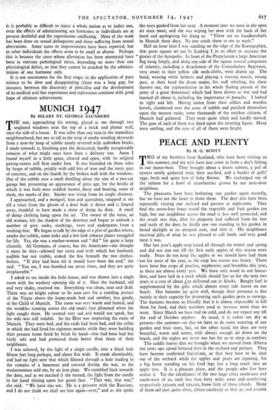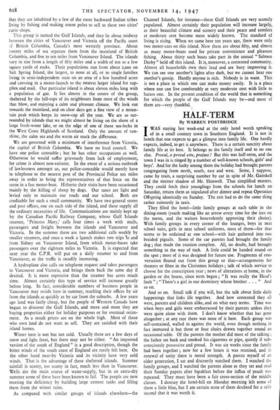PEACE AND PLENTY
By H. G. SCOTT
TWO of my brothers from Scotland, who have been visiting us this summer, and my wife have just come in from a day's fishing in our motor-boat. They brought about a dozen salmon, a pail of oysters newly gathered from their sea-bed, and a bucket of gulls' eggs, fresh and quite free of fishy flavour. We exchanged one of the salmon for a bowl of strawberries grown by our next-door neighbour.
The pheasants have been bothering our garden again recently, but we have not the heart to shoot them. The deer also have been repeatedly visiting our orchard and pasture at night-time. They find the seven-foot fence round the vegetable and fruit garden too high, but our neighbour across the road is less well protected, and the result was that, after his property had suffered from the feet and teeth of the deer, he finally saw one standing in his garden in broad daylight at its arrogant ease, and shot it. His neighbours received gifts of what he was pleased to call lamb, and very good meat it was.
Our last year's apple crop lasted all through the winter and spring and did not run out till the first early apples of this season were ready. Pears do not keep like apples or we should have had them r too for most of the year, as the crop last season was heavy. There have been fine crops of peaches, raspberries and brambles this year, as there are almost every year. We burn only wood in our house- fires, and have laid in a stock which should last us for the next two years at a cost of about L20 delivered cut in blocks. Bought fuel is supplemented by the gifts which almost every tide leaves on our beach. Our bantams lay quite well, though their presence is due mainly to their capacity for destroying such garden pests as earwigs. The bantams become so friendly that it is almost impossible to kill them for food, and their numbers tend to increase more than we want. Since March we have had no cold, and do not expect any till the end of October anyhow. As usual, it is rather too dry at present—the summer—so that we have to do some watering of our garden and fruit trees, but, on the other hand, the days are very beautiful, warm and sunny, with alivays enough air down on the beach, and the nights are never too hot for us to sleep in comfort.
The saddle horses that we brought when we moved from Alberta ten years ago spend leisured days in the orchard and pasture. They have become confirmed fruitarians, so that they have to be shut out of the orchard while the apples and pears are ripening, for a big horse standing on his hind legs has a long reach into an apple tree. It is a pleasant place, and the people who live here realise it. Yet the inhabitants of the two large cities north-east and south-west of us, each less than forty miles away and numbering respectively 250,000 and too,000, know little of these islands. Many of them sail past quite often, glance carelessly as they go and assume that they are inhabited by a few of the more backward Indian tribes living by fishing and making totem polet-to sell to these two cities' curio shops.
This group is named the Gulf Islands, and they lie about midway between the cities of Vancouver and Victoria off the Pacific coast of British Columbia, Canada's most westerly province. About twenty miles of sea separate them from the mainland of British Columbia, and five to ten miles from Vancouver Island. The islands vary in size from a length of fifty miles and a width of ten to a few square yards of rocks. Their populations run from about 2,000 on Salt Spring Island, the largest, to none at all, or to single families living in semi-independent state on an area of a few hundred acres and crossing in a motor-launch to the nearest larger island for sup- plies and mail. Our particular island is about eleven miles long with a population of 400. It lies almost in the centre of the group, sheltered by the hill-tops of its neighbours from most of the winds that blow, and enjoying a calm and pleasant climate. We look out towards the mainland, and on clear days tet a fine view of a moun- tain peak which keeps its snow-cap all the year. We are so sur- rounded by islands that we might almost be living on the shore of a large fresh-water lake, or on the edge of one of those sea-lochs in the West Coast Highlands of Scotland. Only the amount of sun- shine, the calm sea and the warm air mark the difference.
We are governed with a minimum of interference from Victoria, the capital of British Columbia. We have no local council. We have one police constable ; but he has other occupations as well. Otherwise he would suffer grievously from lack of employment, for crime is almost non-existent. In the event of a serious outbreak of lawlessness amongst us, our police-constable would merely have to telephone to the nearest post of the Provincial Police ten miles away in order to bring the representatives of s that force on the scene in a fast motor-boat. Hitherto their visits have been occasioned mainly by the killing of sheep by dogs. Our taxes are light and levied only to maintain our roads and our school. Both are creditable for such a small community. We have two general stores and post offices, one on each side of the island, and these supply all the ordinary necessities of life. Communications are mainly kept up by the Canadian Pacific Railway Company, whose Gulf Islands steamer, ` Princess Mary,' calls four times a week with mails, passengers and freight between the islands and Vancouver and Victoria. In the summer there are two additional calls weekly by smaller steamers, and once a week a launch makes two trips lo and from Sidney on Vancouver Island, from which motor-buses take passengers over the eighteen miles to. Victoria. It is expected that next year the C.P.R. will put on a daily steamer to and from Vancouver, as the traffic is steadily increasing.
A hydroplane also calls on telephone request and takes passengers to Vancouver and Victoria, and brings them back the same day if desired. It is more expensive than the steamer but saves much time. Almost certainly this type of service will increase greatly before long. In fact, considerable numbers of business people in Vancouver may reside here in summer, reaching their offices by air from the islands as quickly as by car from the suburbs. A few years ago land was fairly cheap, but the people of Western Canada have begun to discover the Gulf Islands, and more and more they are buying properties either for holiday purposes or for eventual retire- ment. As a result prices are on the whole high. Most of those who own land do not want to sell. They are satisfied with their island homes.
Winter here is wet but not cold. Usually there are a few days of snow and light frost, but there may not be either. "An improved version of the south of England " is a good description, though the bitter winds of the south coast of England are rarely felt here. On the other hand near-by Victoria and its vicinity have very cold winds. That is the advantage of these sheltered islands. Summer rainfall is scanty, too scanty in fact, much less than in Vancouver. Wells are the main source of water-supply, but in an extra-dry summer some of these have been known to fail. The people are now meeting the deficiency by building large cement tanks and filling them from the winter rains.
As compared with similar groups of islands elsewhere—the Channel Islands, for instance—these Gulf Islands are very scantily populated. Almost certainly their population will increase largely, as their beautiful climate and scenery and their peace and comfort at moderate cost become more widely known. The standard of living is rising. When we came here ten years ago, there were only two motor-cars on this island. Now there are about fifty, and almost as many motor-boats used for private convenience and pleasure fishing. About thirty such boats take part in the annual " Salmon Derby " held off this island. It is, moreover, a contented community. Almost all households Own their land and are busy improving it. We can see one another's lights after dark, but we cannot hear one another's gossip. Hardly anyone is rich. Nobody is in want. This is not a place in which one can make money easily. It is a place where one can live comfortably at very moderate cost with little to harass one. In the present condition of the world that is something for which the people of the Gulf Islands may be—and most of them are—very thankful.































 Previous page
Previous page